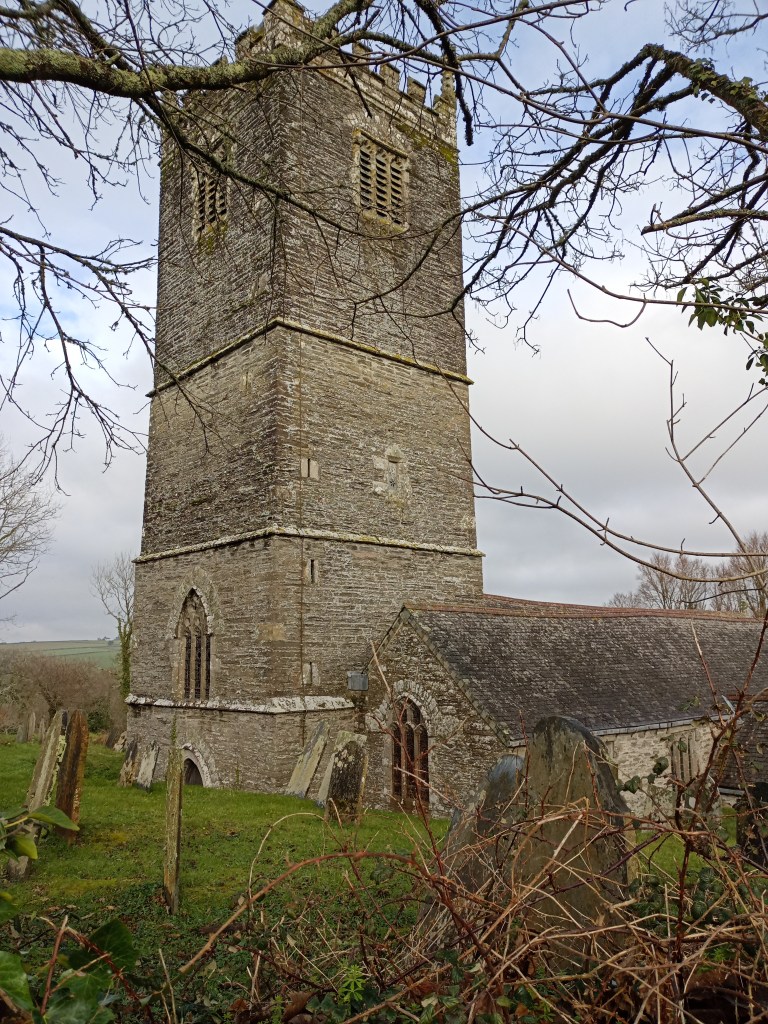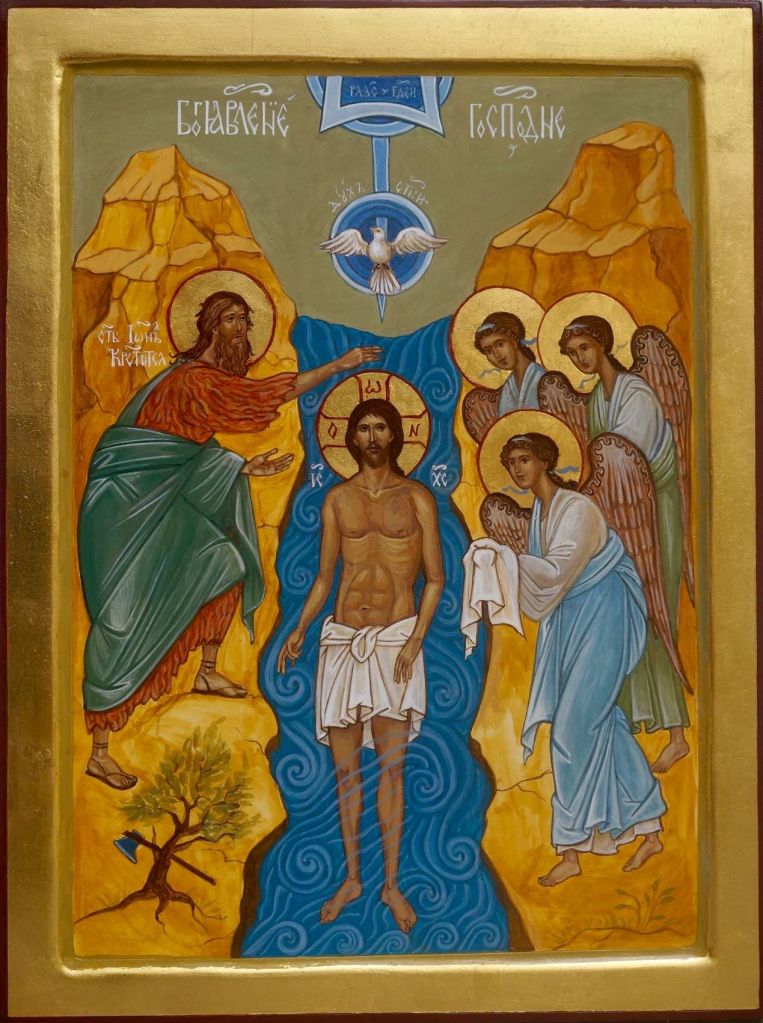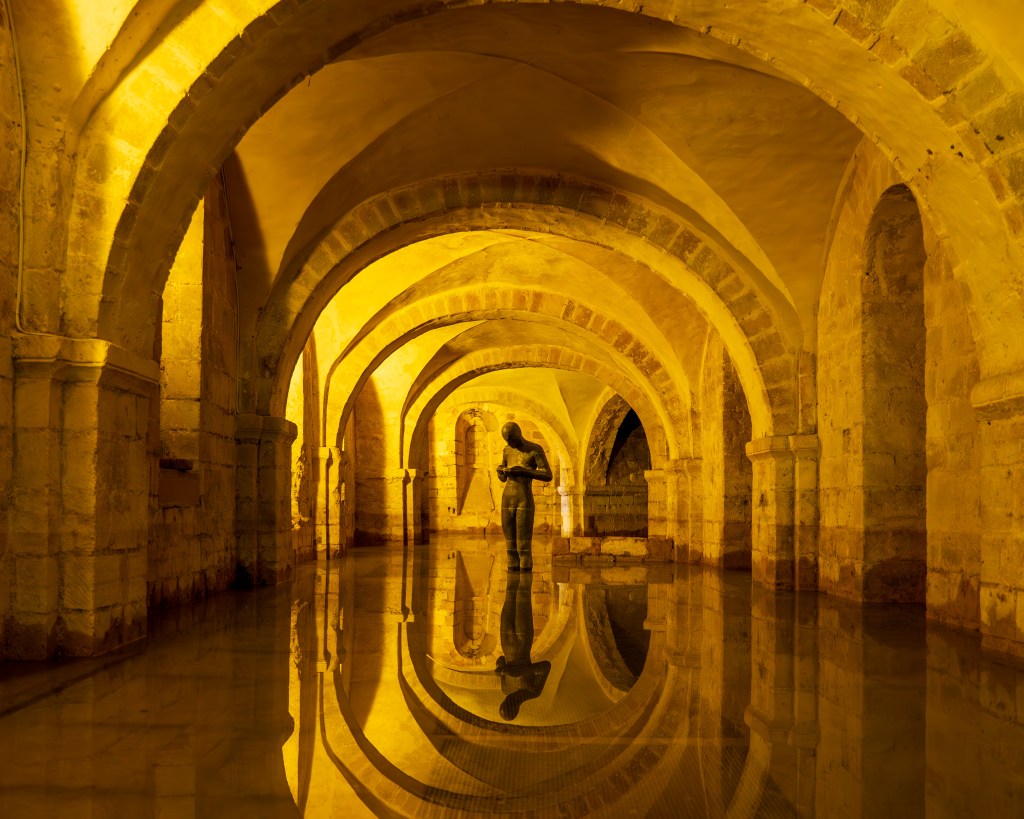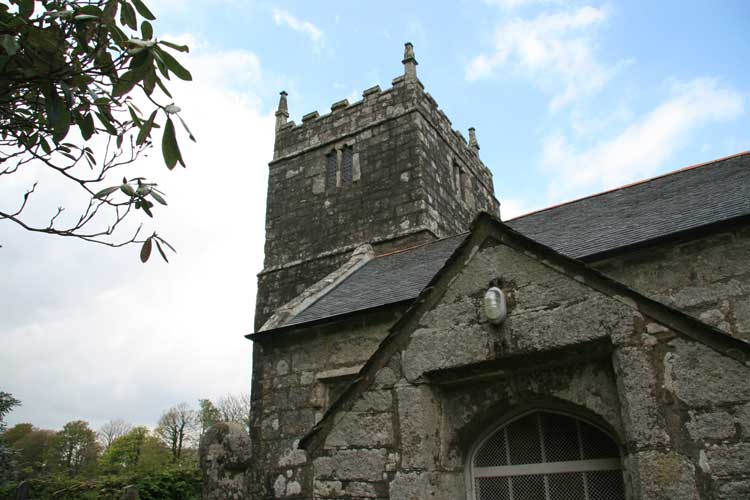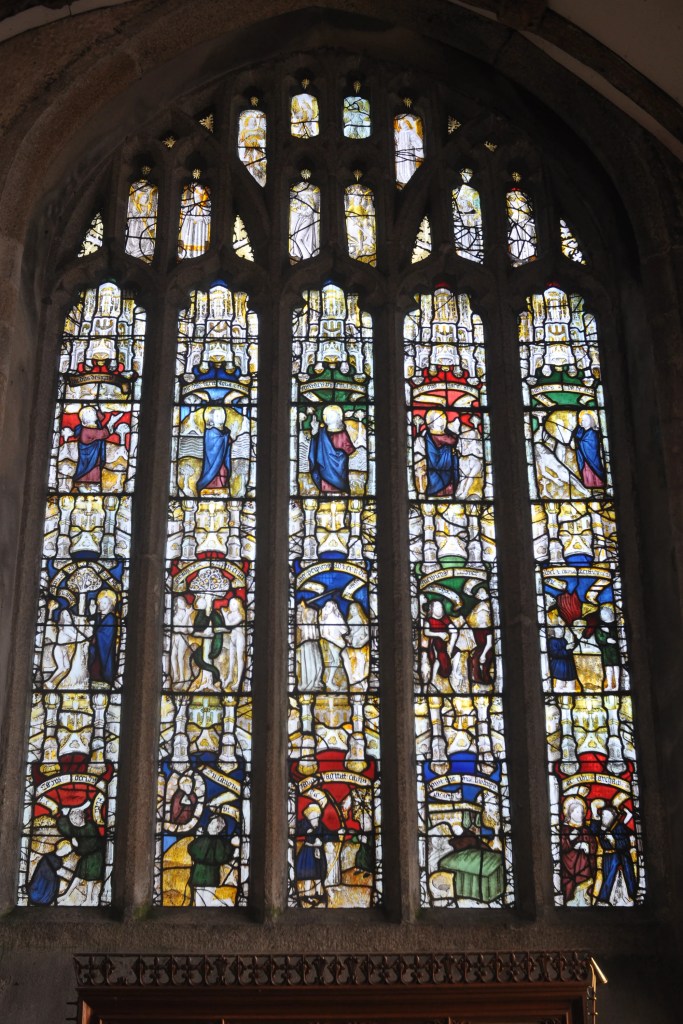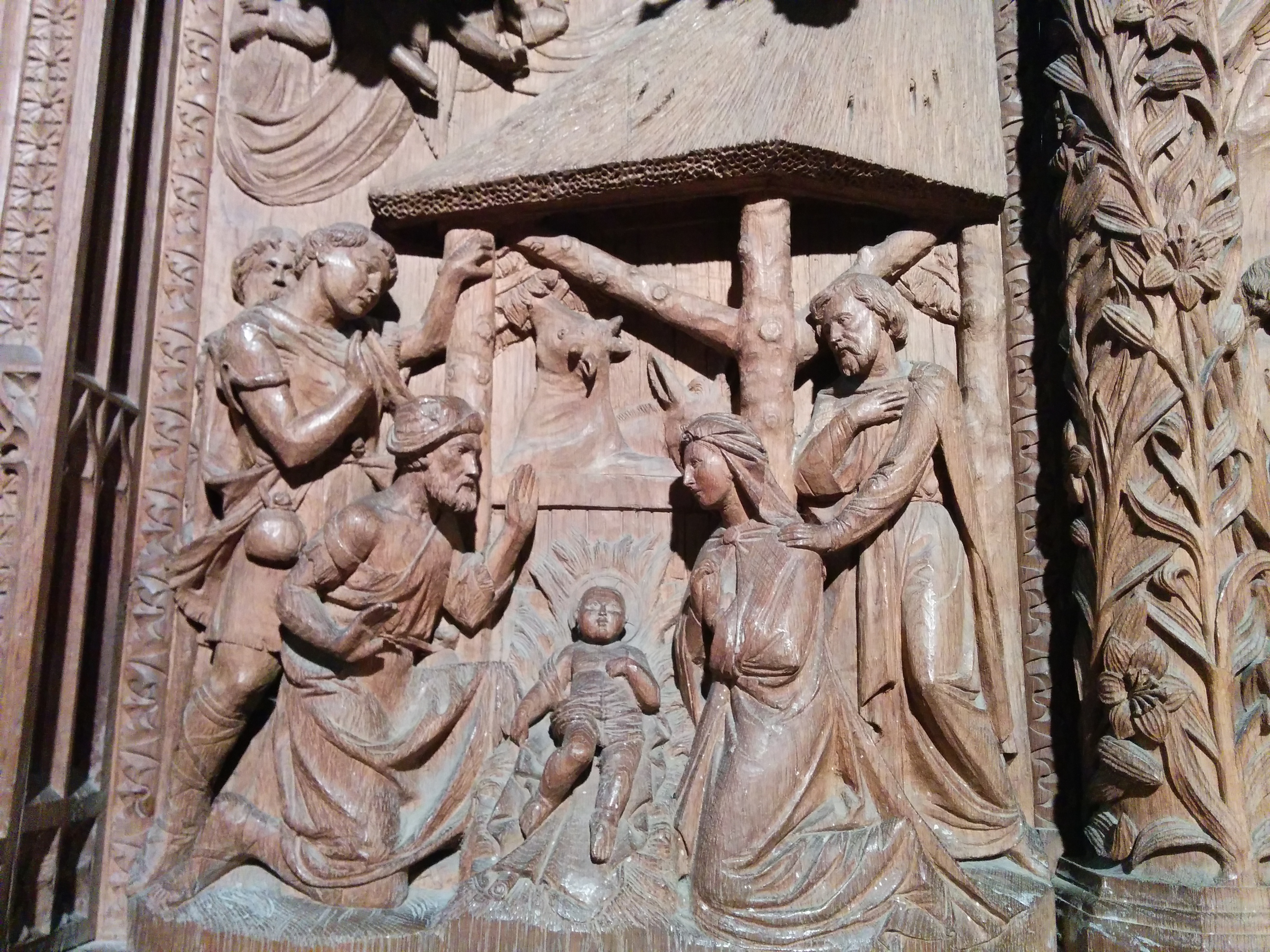
The Nativity scene from the Reredos in St Mary the Virgin, Chilthorne Domer, Somerset. Carving by the Pinwill Sisters
This is the text of a sermon preached at St Neot, Cornwall at Midnight Mass 2025
The readings were, Isaiah 92-7 Titus 211-14 Luke 21-14 (15-20)
Each year, on the 29th May, here in St Neot we celebrate Oak Apple Day. It marks the restoration of the monarchy in 1660 as a branch of oak is hauled to the top of the church tower and remains there until the following May.
That date not only marks the restoration of the monarchy but also the restoration of Christmas celebrations, because in 1647 Parliament had passed an ordinance saying,
That the said Feast of the Nativity of Christ, Easter and Whitsuntide and all other Festival days, commonly called Holy-dayes, be no longer observed … within this Kingdom of England …
The puritan parliament had banned all festivals, not because they were opposed to the Christian religion, but because they considered such festivals to be,
a popish festival with no biblical justification.
For thirteen years Christmas was indeed banned.
Of its restoration the Poors Almanac said,
Now thanks to God for Charles’ return,
Whose absence made old Christmas mourn.
For then we scarcely did it know,
Whether it Christmas were or no.
Well, we all know that it’s Christmas now with the endless stream of Christmas specials and the supermarket and perfume adverts on TV, the cards, the decorations, the lights, the Christmas carols, the Christmas songs, the parties – this is all part of our modern Christmas.
Sometimes I wonder if the puritans didn’t have a point. But “No!” Happily, we do not live under such strictures. We are able to celebrate the birth of our Saviour as we gather in church to worship, or as we get together with family or friends and exchange gifts, or sit quietly in front of the TV and listen to the King’s Christmas message, gin and tonic in hand (other drinks are available).
However, we celebrate Christmas, whether as a religious festival or a secular party, or even if we choose to ignore it altogether, muttering “Bah! Humbug” to any unwelcome reference to the season of goodwill, we are free to keep it in our own way. And, I’m delighted that you have chosen to celebrate here, in church, as we begin our celebration of the birth of our Saviour, the God, who in Jesus becomes incarnate – true God and true Man, fully divine and fully human.
But what is it that has brought you here tonight?
Perhaps for you it’s a family tradition to start the Christmas celebration by attending midnight mass to sing the carols, to enjoy the flickering lights of candles shining in the half light of the church and to make your Christmas communion.
Maybe, over the past months and years, watching the news on TV, seeing the slaughter of innocent people in Ukraine or Palestine and Israel or Sudan or Bondi Beach you’ve been deeply affected.
Possibly you’ve been troubled by news of the increasingly disastrous weather affecting many of the world’s poorest in places like Jamaica, Cuba and the Philippines recently, and heard the weather forecasters on TV telling us that the climate crisis has caused this year to be the second or third warmest on record, or that during the heatwaves of the summer numbers of vulnerable people are suffering or even dying. And you’ve thought there has to be a better way to run our world, a better response to the problems facing us, a more positive way to be found to be human than this. Perhaps there’s some hope to be discovered in the coming of the Prince of Peace as a baby in a stable in Bethlehem.
Perhaps you worship here, or, if you’re visiting, in your own church Sunday by Sunday. You are a committed Christian and celebrating the birth of Jesus is your top priority in this Christmas season. You enjoy the parties and the Christmas songs and the Christmas movies and the family get-togethers but praising God for being born a human infant and bringing hope to the world is what Christmas is really all about for you.
Possibly the weaponisation of Christianity by the far right to bolster their political campaigns has reminded you of a latent faith in Jesus Christ and made you think you want to realign yourself more closely with the mainstream Christian church.
Maybe you’ve been dragged along by a parent or a friend, not quite sure why you’re here. It seems harmless enough but do I belong? Is this where I want to be?
It could be that you’re just curious. You want to know more. Does this story about angels and shepherds and wise men have something worthwhile to say to us today? Is it just a pretty story or are there deep truths wrapped up in it?
I have to say to you now that none of these are bad reasons for being here; whatever the reason that brought you – it’s a good one – you are in the right place!
I am confident that for, most likely, everyone here there is something about the Christmas story that we find compelling and beautiful. It doesn’t matter whether we believe this story to be an accurate, factual description of the birth of Jesus, or if we see it as a metaphor for the way in which God deals with his creation.
Either way the story is one full of deep truth and beauty. It speaks to us of the love of God and his desire for his whole human creation to know him and to find hope in him.
This story reminds us that God loves all people – white and black, rich and poor, the oppressed and the oppressors, the victims of war, those injured and killed, those who flee and seek a safe place to be and to bring up their families, and the perpetrators of war and terror, good and evil alike. God’s sending of his Son is evidence of his desire for all people to be called to seek him and find him – to repent and find renewal, hope and peace in the child that today we see in manger and on Good Friday we shall see hanging on the cross and on Easter Day defeating death and rising to new life and bringing us with him.
And it’s all there in this simple story.
For in Luke’s gospel the angel tells the shepherds, when Christ is born,
I bring you news of great joy, a joy to be shared by the whole people. Today in the town of David a Saviour has been born to you; he is Christ the Lord.
In Matthew’s gospel we are reminded of God’s words through the prophet Isaiah,
Look! the virgin is with child and will give birth to a son whom they will call Immanuel, a name which means ‘God-is-with-us’.
In John’s gospel we are told,
to those who did accept him he gave power to become children of God
and
The Word became flesh, he lived among us, and we saw his glory, the glory that he has from the Father as only Son of the Father, full of grace and truth.
A Saviour who is born to us, whose name tells us that he is God-with-us, who reveals to us the grace and truth that is in God’s Word become flesh – God become human; God Incarnate.
Does Christmas tell us that God will solve all our problems? That if we pray the right prayers, or believe the right things, or perform the right rituals God will sort everything out for us?
No! Christmas doesn’t tell us this at all.
It tells us that God is on our side. That God is alongside us – when we suffer, he suffers with us. When we’re frightened he shares our fear. When we’re justly angry he shares our anger. When we’re delivered from pain, suffering or sorrow he shares our relief. When we’re happy he shares our joy.
Because, in Jesus, God became human – just like you or me. The miracle of Christmas is not that a baby was born in Bethlehem, but that the baby who was born in Bethlehem is the God who shares our human nature so that we might share his divine nature.
God can change us, when we’re ready to be changed; God can change the world, but only when we’re ready to change it. It’s something that we have to do together.
Christmas is a challenge to allow change to happen – in ourselves, each one of us, and in our world.
I wish you a blessed, holy and happy Christmas, a Christmas in which Jesus reveals himself to you and transforms you into his image.
